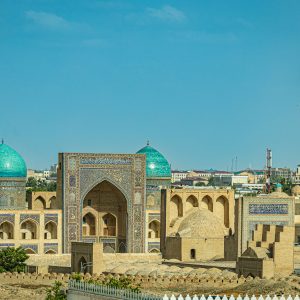Biden’s final UN address urges peace, but defends Israel in Middle East
The 79th session of the UNGA thus opened under the shadow of profound global instability, with leaders like Biden and Guterres calling for a renewed commitment to international cooperation
Muslim Network TV
NEW YORK (MNTV) – The 79th session of the United Nations General Assembly began on a poignant note as 81-year-old U.S. President Joe Biden delivered what is likely his final speech at the global forum.
His address was preceded by a powerful speech from UN Secretary-General Antonio Guterres, who painted a grim picture of a world grappling with unprecedented challenges, from geopolitical tensions to climate change.
In his own address, Biden reflected on his extensive political career, touched upon the major issues facing the world today, and addressed both domestic and international audiences as he outlined his administration’s achievements and the challenges ahead.
Biden’s speech opened with a nostalgic look back at his early days in politics during the Cold War, Vietnam War, and escalating Middle East tensions.
“Our country was divided and angry, there were questions about our staying power and our future,” he said, reminiscing about the challenges he faced when he began his career. Yet, he emphasized resilience, stating, “Things can get better. We should never forget that.”
Demanding peace, defending Israel
Biden’s discussion of the Middle East began with a strong defense of Israel’s response to the recent war in Gaza, referring to the October 7 attacks on southern Israel.
“Any country would have the right and responsibility to ensure that such an attack could never happen again,” he said.
However, he acknowledged the suffering of civilians in Gaza, calling their situation “hellish” and emphasizing the need to prevent a wider regional war.
He also urged Israel and Hamas to accept a U.S.-brokered ceasefire deal proposed in May, a plea that comes amidst criticism of the U.S. for its perceived reluctance to pressure Israel, despite ongoing humanitarian concerns.
Defending decisions and rebuilding alliances
The President then turned to one of the most controversial decisions of his tenure—the withdrawal of U.S. troops from Afghanistan, a point of contention that has been heavily criticized by his Republican opponents.
“It was a hard decision, but the right decision. Four American presidents faced that, but I was determined not to leave it to the fifth,” he asserted, defending his administration’s stance.
Biden highlighted his efforts to reinvigorate U.S. alliances and partnerships, which he argued were neglected by his predecessor, Donald Trump.
“We rebuilt our country’s alliances and partnerships to levels not previously seen,” he stated. This remark was a subtle jab at the isolationist tendencies of his Republican rival and current frontrunner for the upcoming presidential election, Kamala Harris, who has promised a more restrained foreign policy approach.
Support for Ukraine and a cautionary stance on China
Turning to global security, Biden reiterated his administration’s unwavering support for Ukraine in the face of Russia’s continued aggression.
“Putin’s war has failed at its core aim,” he said.
“He set out to destroy Ukraine, but Ukraine is still free. He set out to weaken NATO, but NATO is bigger, stronger, and more united than ever before.”
Regarding China, Biden stressed the need for the U.S. to “uphold our principles as we seek to responsibly manage the competition,” signaling a commitment to maintaining a tough but measured stance towards Beijing to avoid conflict.
His comments reflected his administration’s broader strategy of balancing assertiveness with diplomacy in its dealings with the world’s second-largest economy.
Advocating for global Solutions to global Problems
Biden called for more robust international efforts to tackle issues such as sustainable development, climate change, illegal arms flow, and the ethical use of artificial intelligence.
He also reiterated the U.S.’s support for reforming and expanding the UN Security Council, though he remained firm on not supporting additional veto powers for new members.
In a personal and philosophical conclusion, Biden reflected on his decision not to run for re-election, urging world leaders to prioritize their peoples’ well-being over political longevity. “Some things are more important than staying in power,” he declared.
Earlier while inaugurating the session UN Secretary-General Antonio Guterres gave a stark assessment of global affairs, describing the world as being in a “whirlwind” of unprecedented challenges.
He highlighted escalating geopolitical tensions, the threat of nuclear conflict, and the devastating impact of climate change.
“Geo-political divisions keep deepening,” Guterres warned, citing conflicts in the Middle East, Europe, and Africa as symptomatic of a global system in disarray.
He cautioned against the growing trend of impunity among states, where governments feel free to disregard international laws and norms without consequence.
“They can invade another country, lay waste to whole societies, or utterly disregard the welfare of their own people. And nothing will happen,” he lamented.
The Secretary-General expressed grave concern over the situation in Gaza, where the rapid escalation of violence has resulted in unprecedented destruction and loss of life, including over 200 UN staff members.
“The speed and scale of the killing and destruction in Gaza are unlike anything in my years as secretary-general,” he said.
He also drew attention to the fragile situation in Lebanon, warning that it is “at the brink” and could become “another Gaza.”
Guterres reiterated his demand for an immediate ceasefire and called for a renewed commitment to the two-state solution as the only viable path to peace in the region.
Guterres’s speech painted a bleak picture of a world teetering on the edge but concluded with a message of hope and a call to action.
“The level of impunity in the world is politically indefensible and morally intolerable,” he declared, urging world leaders to confront these challenges with courage and resolve.
He contrasted today’s disorder with the more predictable tensions of the Cold War, where, despite its dangers, there were rules and mechanisms to prevent the worst outcomes.
Now, he warned, the world finds itself in a “purgatory of polarity,” with many countries acting unpredictably and unaccountably in the absence of a stable international order.
The 79th session of the UNGA thus opened under the shadow of profound global instability, with leaders like Biden and Guterres calling for a renewed commitment to international cooperation and a reimagining of the global order to address the pressing challenges of the 21st century.
###









